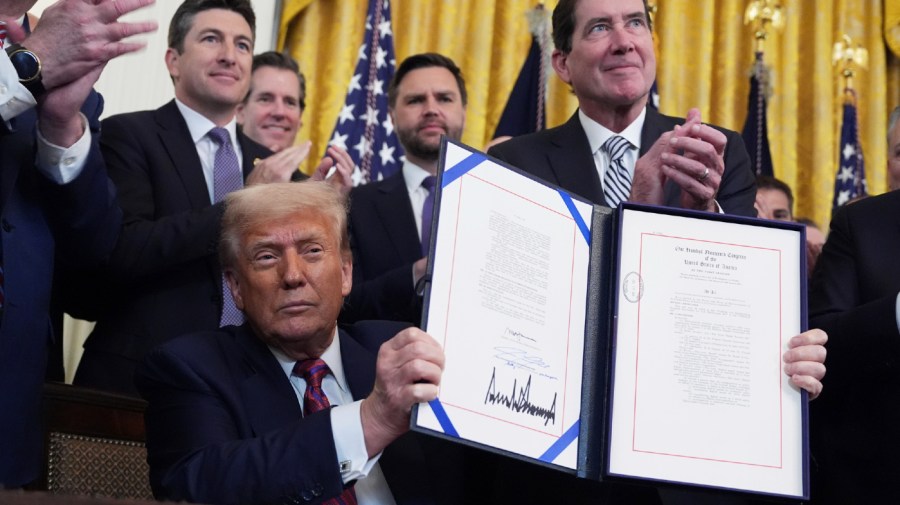(The Hill) — President Donald Trump enacted the GENIUS Act into law on Friday, signing it on Friday.first major cryptocurrency legislation.
The legislation, which establishes a regulatory structure for payment stablecoins,reached Trump’s deskFollowing a chaotic week in the House, as rival Republican groups protested a set of three cryptocurrency-related bills.
The chaos caused the House floor to be disrupted chaos led to the House floor being thrown into turmoil chaos resulted in the House floor being in disarray chaos created disorder on the House floor chaos brought about chaos on the House floor chaos led to the House floor being in a state of confusion chaos caused the House floor to become unmanageable chaos resulted in the House floor being in turmoil chaos brought the House floor into a state of disorder chaos led to the House floor being thrown into chaoscame to a halt and created the longest voting session in history within the chamber. Republican leaders reached an agreement late Wednesday night to continue with the review of the bills, unblocking the floor and enabling votes to take place on Thursday.
The House finally approved the GENIUS Act with a vote of 308-122, as 102 Democrats joined the majority of Republicans in backing the bill.
Here are five key points regarding the newly established stablecoin legislation:
‘Official endorsement’ for the cryptocurrency sector
The enactment of the GENIUS Act represents a significant achievement for the sector, as “the first step of the U.S. government truly regulating cryptocurrency,” noted Rob Nolan, a partner at Duane Morris and part of the law firm’s digital assets and blockchain team.
As the first significant digital assets legislation to pass through Congress and gain the president’s approval, it grants the industry a new level of credibility.
It’s significant because when you have a law… it essentially provides a Good Housekeeping seal of approval to the industry,” Ian Katz, managing partner at Capital Alpha, said to The Hill. “Now, Congress and the president of the United States are endorsing the legitimacy of this industry.
You may view the law as promoting the activity,” Katz stated. “For many individuals, this is the kind of measure required to truly spark an industry.
The approval of the bill signifies a significant shift in the industry’s prospects in Washington, which only a year ago appeared quite uncertain.
The sector faced difficulties in recovering its stability following the unexpected downfall of the cryptocurrency exchange FTX in 2022, along with the fraud allegations brought against its founder, Sam Bankman-Fried. He was eventually convicted andsentenced to 25 years in prison.
During the Biden administration, the industry also faced former Securities and Exchange Commission (SEC) Chair Gary Gensler, who initiated multiple enforcement actions against cryptocurrency companies. They claimed Gensler was trying to regulate through enforcement efforts instead of offering clear guidelines.
In contrast, Trump has supported the industry during his second term, appointing David Sacks as the artificial intelligence (AI) and cryptocurrency chief, hosting cryptocurrency leaders at the White House, and issuing an executive order to establish a strategic bitcoin reserve and digital asset inventory.
Broader cryptocurrency framework still under development
Although the industry achieved a significant win with the GENIUS Act, it is only one piece of the broader regulatory puzzle concerning digital assets.
“This is merely the beginning of a small sample, as it truly represents only a fraction of cryptocurrency assets,” Nolan added.
Cryptocurrencies come in various forms, with stablecoins being a specific category. These are designed to have a stable value by being linked to an external asset, such as the U.S. dollar.
Congress has not yet enacted laws establishing a more comprehensive cryptocurrency framework. The main challenge is determining how to divide regulatory authority between the SEC and the Commodity Futures Trading Commission.
The House last week passed its versionRegarding the structure of crypto market regulations, known as the Digital Asset Market Clarity Act. The Senate, which has been proceeding more slowly, is also working on its own discussion draft to be released.
Although the White House and GOP leaders had initially planned to get both stablecoin and market structure legislation passed before Congress adjourns for its August break, they are now focusing on completing the second major cryptocurrency bill by the end of September.
Financial oversight authorities assume additional duties
Under the GENIUS Act, various financial regulators will assume additional duties in overseeing stablecoins.
The Office of the Comptroller of the Currency (OCC) will be responsible for supervising standalone stablecoin issuers, while it, along with the Federal Reserve, Federal Deposit Insurance Corporation, and National Credit Union Administration, will continue to regulate entities they already monitor that issue stablecoins.
Stablecoin providers may be able to speed up the approval procedure if they obtain a banking charter from the OCC, which has already encouraged multiple stablecoin companies, such as Circle and Ripple, to seek bank licenses.
Banking sector resists crypto charters
The banking sector is not fully satisfied with the current trajectory and is expressing its worries, especially regarding certain stablecoin providers aiming for bank charters.
In a letter sent to the OCC on Thursday, several prominent banking groups raised concerns about whether stablecoin issuers would be engaging in the functions of national trust banks and requested the agency to pause consideration of their applications for the time being.
“Considering these significant issues, along with the policy, legal, and business consequences that granting the applicants’ charters would have on the banking sector, the associations recommend that the OCC delay reviewing the applications,” the banking organizations stated.
Classic athletes evaluate the acceptance of stablecoins
Although some express worries, many established players in the financial services industry are exploring or have begun transitioning into stablecoins.
Bank of America’s CEO, Brian Moynihan, mentioned last week that his institution is aiming to introduce a stablecoin, while Citigroup’s CEO, Jane Fraser, indicated her bank is exploring similar possibilities, according to a report by Reuters.
JPMorgan Chase revealed last month that it is introducing a deposit token similar to a stablecoin named JPMD, and CEO Jamie Dimon mentioned last week that his firm plans to participate in the stablecoin sector, as reported by CNBC.
Katz mentioned that he anticipates conventional players will “not allow independent stablecoin issuers to simply take over that potential market.”
Some may not be entirely convinced that this market will reach the size being predicted, but they can’t afford to take any risks,” he stated. “They need to prepare defensively and ensure they aren’t left behind if stablecoins significantly grow in the next few years.
Copyright 2025 Nexstar Media, Inc. All rights reserved. This content cannot be published, aired, altered, or shared again.






